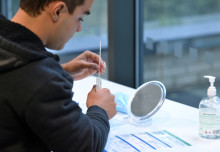

<tiptext>Researchers show that warfarin reduces the scarring on the liver caused by Hepatitis C <em>- News Release</em>
Imperial College London News Release
For immediate release
Thursday 31 July 2008
The drug warfarin may help prevent liver failure in thousands of people with Hepatitis C, according to new research.
In a study published tomorrow (1 August) in the Journal of Thrombosis and Haemostasis, researchers show that warfarin reduces the scarring on the liver caused by Hepatitis C. This scarring, or fibrosis, replaces normal liver cells and can lead to cirrhosis of the liver and ultimately liver failure.
See also:
Following the new findings in mouse models, the Imperial College London researchers are now embarking on a clinical trial of warfarin as a treatment for people with Hepatitis C, funded by the Medical Research Council (MRC).
There are an estimated 300,000 people in the UK with chronic Hepatitis C. The disease progresses much more quickly in some patients than in others and around one in five of those infected will develop cirrhosis.
Scarring on the liver in Hepatitis C replaces normal liver cells and can lead to cirrhosis and ultimately liver failure.
Treatment to clear the infection is currently effective in only around 50 percent of patients and can have considerable unpleasant side effects such as fatigue, nausea and depression. If this treatment fails, there are no currently effective therapies to slow the progression of fibrosis.
The new research looks at how warfarin affects the progression of fibrosis in mice with chronic liver injury. Warfarin is already used to prevent and treat blood clots in people with artificial heart valves, deep vein thrombosis, and a host of other conditions.
Scarring on the liver replaces normal liver cells and can ultimately lead to liver failure.
A previous study by the same researchers demonstrated that in Hepatitis C, scarring of the liver accelerates in those patients who are prone to form blood clots. This led the researchers to believe that warfarin's anti-clotting properties might enable the drug to fight the disease.
The new study showed that treatment with warfarin significantly reduces the progression of fibrosis in normal mice with chronic liver injury. It also shows that warfarin reduces the progression of fibrosis in mice with chronic liver injury and a genetic mutation known as Factor V Leiden (FVL), which causes fibrosis to progress at a much faster rate than usual because it amplifies the body’s clotting mechanisms. The work was supported by the Horton Foundation and the NIHR Biomedical Research Centre funding scheme.
Professor Mark Thursz, one of the authors of the study from the Division of Medicine at Imperial College London, said: "At the moment there are a great many people with Hepatitis C who have no treatment options left and it would transform their lives if we could prevent them from developing liver failure. We are looking forward to seeing the results of our upcoming trial in humans now that we’ve had such promising results in the trial in mice."
Dr Quentin Anstee, an MRC Clinical Research Fellow and the corresponding author of the study from Imperial College London, added: "If we have positive results from the new trial, we will have a potential treatment that is already available and very cheap, and which should be safe enough for people to take. If we are successful in Hepatitis C patients, we are hopeful that such treatment might benefit people with liver damage from other causes, and this is something we would be keen to study further."
The researchers are recruiting 90 patients for the new trial who have undergone a liver transplant as a result of liver failure caused by hepatitis C. A third of such patients progress very rapidly to fibrosis following transplantation.
The researchers hope that treating these patients with warfarin will prevent this liver damage and improve their prognosis. Transplant patients have a liver biopsy every year following transplantation to assess their progress, and the researchers will analyse data from this biopsy to establish the effectiveness of the warfarin treatment. The two-year trial will take place across five centres including Imperial College Healthcare NHS Trust, which has integrated with Imperial College London to form the UK's first Academic Health Science Centre.
The trial is taking place in transplant patients because the researchers estimate that it would take 10-15 years to conduct a trial in patients in whom the disease was progressing at a normal rate.
-ends-
For further information please contact:
Laura Gallagher
Press Officer
Imperial College London
e-mail: l.gallagher@imperial.ac.uk
Telephone: +44 (0)207 594 6702 or ext. 46702
Out of hours duty Press Officer: +44 (0)7803 886 248
Notes to editors:
1. "Coagulation status modulates murine hepatic fibrogenesis: implications for the development of novel therapies" Journal of Thrombosis and Haemostasis, published in print 1 August 2008
Corresponding author: Quentin M Anstee, Imperial College London (for full list of authors please see paper)
2. The Medical Research Council supports the best scientific research to improve human health. Its work ranges from molecular level science to public health medicine and has led to pioneering discoveries in our understanding of the human body and the diseases which affect us all.
3. About Imperial College London
Imperial College London - rated the world’s fifth best university in the 2007 Times Higher Education Supplement University Rankings - is a science-based institution with a reputation for excellence in teaching and research that attracts 12,000 students and 6,000 staff of the highest international quality. Innovative research at the College explores the interface between science, medicine, engineering and business, delivering practical solutions that improve quality of life and the environment - underpinned by a dynamic enterprise culture. Website: www.imperial.ac.uk
Article text (excluding photos or graphics) available under an Attribution-NonCommercial-ShareAlike Creative Commons license.
Photos and graphics subject to third party copyright used with permission or © Imperial College London.





